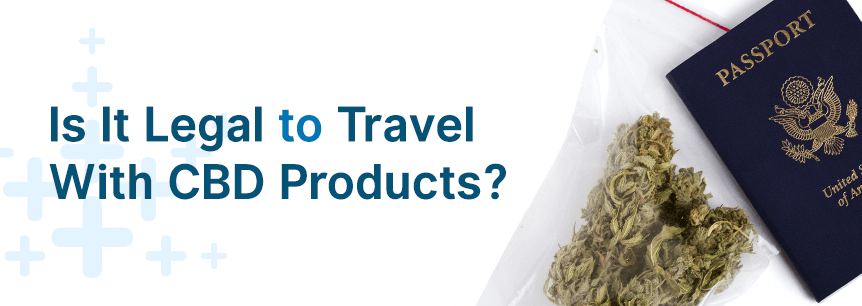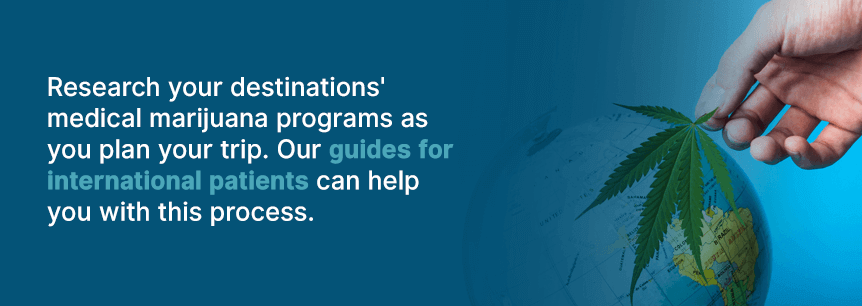
Cannabidiol (CBD) medication helps you function through everyday life, including when you travel. However, the federal and state governments have different laws regarding marijuana medicine. Some of these rules impact CBD products, even when they don’t have much THC in them. Let’s go over your legal options for traveling with CBD.
If you plan on taking a plane to your destination, you may want to leave your CBD at home. The TSA does not allow any cannabis products on planes, even CBD oil. They note that their officers focus on possible threats during their screenings. So, they don’t prioritize searching for marijuana items. However, if they see an infused product while searching your possessions, they will get in touch with law enforcement. Bring CBD on a plane at your own risk.
As mentioned in our medical marijuana travel guide, bringing cannabis across state lines counts as drug trafficking under federal law. Any product with more than a 0.3 percent THC content goes under the category of marijuana. If you take medicine with more than trace amounts of THC in it, you could face severe consequences. When you transport CBD across states, you do it at your own risk.
Whether your destination states allow you to carry CBD depends on their laws. We recommend planning your trip by researching each state’s policies. This includes any states you will pass through during your travels. See if the states allow recreational marijuana and what conditions they approve for medical marijuana. You may also want to look into the states’ reciprocity laws. Reciprocity laws determine if a state accepts out-of-state medicinal cannabis cards. Some states with reciprocity laws let out-of-state cardholders possess marijuana, while others let them buy it.
You may know that you can get two types of CBD — hemp-based and marijuana-based. Federal and state laws differentiate these two kinds of medicine. According to regulations, both hemp and marijuana come from the Cannabis sativa plant. The factor that makes hemp and marijuana different is their THC content. As we mentioned, a cannabis product that has more than 0.3 percent THC counts as marijuana. Meanwhile, an item with 0.3 percent THC or less falls under the hemp category.
Thanks to the signing of the 2018 Farm Bill, hemp now has legal status on a federal level. The previous 2014 Farm Bill allowed hemp, but only in the context of research. Now, the DEA considers hemp products a non-controlled substance, meaning you will not get punished for having it. In the 2018 Farm Bill, you can even find explicit legalization of transporting hemp products across state lines. While the DEA placed CBD enforcement low on their priorities, patients now have further protections from persecution.
We want to note that if you use marijuana-based CBD to medicate, hemp-based CBD may not provide as much relief. In addition to having lower levels of THC than marijuana, hemp also has smaller amounts of CBD. Make sure you understand this difference before bringing hemp CBD as a substitute for your cannabis CBD.
Patients who use marijuana-based CBD may have the option to buy medicine in their destination state. Out-of-state patients can buy medicine in:
Traveling to another country with CBD brings with it the challenges of taking it onto a plane and keeping your destination country’s laws in mind. You will go through many searches at entry points and in customs. If you get caught with cannabis medicine during these screenings, you could be charged with federal or international drug trafficking. Patients can get marijuana medicine in many countries, so you may have the option to buy it while you’re abroad.

Research your destinations’ medical marijuana programs as you plan your trip. Our guides for international patients can help you with this process. Some countries have laws that allow anyone to buy CBD medicine in specific concentrations. Others allow the sale of medical marijuana, but only to citizens.
To avoid legal persecution when traveling with CBD, we recommend that you:
Ready for more information about CBD? Our comprehensive guide to CBD will give you an overview of the compound and its benefits. You can also visit our CBD blog section to find more posts about this cannabinoid. To get personalized, professional advice, we also recommend consulting a cannabis-trained doctor. Our directory of physicians can help you find one in your area.
No Information on MarijuanaDoctors.Com should be used to diagnose, treat, prevent or cure any disease or condition. You can view our Full Disclaimer here.